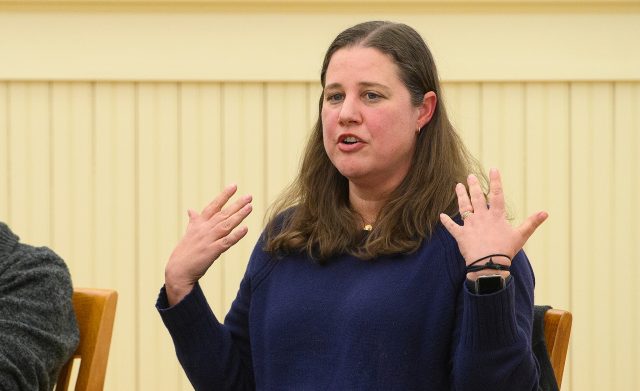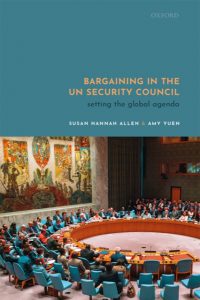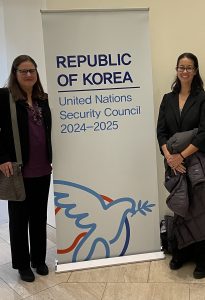
Political science professor Susan Allen shares insights during a campus panel discussion on ‘Making Sense of Events in Ukraine’ in 2022. Allen has shared her expertise in a new book and during a visit with diplomats at the Permanent Mission of the Republic of Korea in New York. Photo by Thomas Graning/Ole Miss Digital Imaging Services
OXFORD, Miss. – A University of Mississippi professor’s new book is catching the attention of international peacekeepers.
Susan Allen, associate professor of political science, recently co-authored “Bargaining in the UN Security Council: Setting the Global Agenda.” The book (Oxford University Press, 2022) examines the factors that play into whether the Security Council responds to an international peace and security threat.
“The formal rules of the institution haven’t changed since 1986, yet we’ve seen a lot of differences in the way the council acts since the end of the Cold War,” Allen said. “Their actions reflect the international policy environment – who is getting along at a particular time and what the conflicts are at a particular time. It’s about the informal rules and relations between the member nations.”
 The text was so compelling that it was noticed by some of the world’s top diplomats at the Permanent Mission of the Republic of Korea.
The text was so compelling that it was noticed by some of the world’s top diplomats at the Permanent Mission of the Republic of Korea.
“Someone on the staff at the South Korean mission got a copy of the book, read it and was really interested,” Allen said. “They suggested that others on the permanent staff read it.
“In collaboration with the Center on International Cooperation at NYU, they then reached out to us and asked if we would be willing to talk about our research and engage in bridging the gap between educators and policymakers.”
Allen and her co-author, Amy Yuen, traveled to New York City to visit the South Korean mission, where they participated in a panel conversation Dec. 2 and spoke about their findings. The presentation was tailored to elected members of the council.
“There were representatives from more than 20 countries,” Allen said. “We answered questions, and they told us about their day-to-day issues. It was a valuable exchange of different perspectives.”
Yuen, who is chair of the political science department at Middlebury College, was excited to have the opportunity to visit the South Korean mission.

Susan Allen (left) and co-author Amy Yuen visit the South Korean mission in New York. Submitted photo
“It was incredible to speak with practitioners who are inside the room as the Security Council debates and negotiates pressing issues,” Yuen said. “We shared what we learned from this project with representatives from many missions who have or will sit on the council, and they shared their experiences and impressions with us, spurring new ideas for further research.”
After the panel discussion, the pair met most of the South Korean mission staff.
“They are getting ready to go to council in 2024 and looking to maximize their influence,” Allen said. “They asked about their ideas and asked us how best to approach these issues.
“That was pretty thrilling. To know that people were that engaged, and our advice was practical in that way.”
John M. Bruce, chair of the Ole Miss political science department, praised Allen for her contributions and said they raise her visibility “well beyond academia.”
“The fact that members of the Security Council are reaching out for guidance on how best to navigate their time on the Security Council is evidence of the value of (Allen’s) research,” Bruce said. “The University of Mississippi benefits from this level of scholarly work, and the experience of our students is greatly enhanced by the presence of scholars like Dr. Allen.”